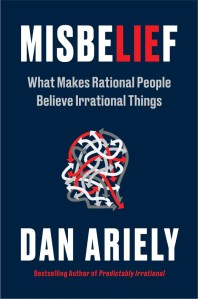MISBELIEF in Russia

I’m very happy that my book MISBELIEF will soon be published in Russia. Here is the Russian translation of the title:
TIME OF MISBELIEFS: Why Smart People Are Liable to Falsifications, Spread Rumors and Believe in Conspiracy Theories.
I wonder what the reaction will be in Russia, and how much the Russian readers will think about this book in terms of what’s happening in Russia, and how much they will think of it in terms of what’s happening outside of Russia.
You can learn more about the book MISBELIEF here.
Corrosive information, Shibboleth, Ramaswamy and my new book: MISBELIEF
A few weeks ago, David French wrote a very compelling and troubling OpEd in the New York Times, under the title: “The Articulate Ignorance of Vivek Ramaswamy.”
The main point focused on a response that Vivek Ramaswamy gave during the Republican debate to the question of whether Mike Pence did the right thing by certifying the presidential election on Jan. 6, 2021. Ramaswamy’s response was that if he was in Pence’s shoes, he would have “pushed for a new federal law to mandate single-day voting, paper ballots and voter identification.”
French then goes on to explain that this is “a crazy, illegal, unworkable idea on every level,” which of course it is. French then continues to wonder how can anyone make such an impractical and impossible statement. This is where French, and I suspect most people, miss an important shift in the current political communication landscape – a shift toward shibboleth.
What is shibboleth? As I explain in my new book MISBELIEF, the modern term shibboleth is based on a biblical story where two tribes, the Ephraimites and the Gileadites, pronounced the word shibboleth differently. After a bloody war between them, when someone tried to cross the river, they asked them to pronounce shibboleth and if the pronunciation was different from their own pronunciation, they person in question was killed. The way that social scientists use the term shibboleth is as a kind of linguistic password that identifies people’s belongingness to a group. This is also the key to better understanding our modern political discourse, and within it also understanding Ramaswamy and his comment.
My guess is that when Ramaswamy proposed his new federal law, he did not really mean it as a real solution to the question. Nor was he adding facts to the discussion. No — he was signaling. Imagine that Ramaswamy would have said something of the republican-run-of-the-mill category. Maybe he would have said that he would have gathered the Republican leadership to discuss the issue. Or maybe that he would have made sure to publicly register his protest. Any such more modest statements would not portray him as a real true Republican leader. They would just portray him as a standard Republican. In contrast, by saying something impossible and outlandish he is using shibboleth and marking himself as a person with the qualities of a true Republican leader.
This is where French was wrong in his analysis because he mistakenly assumed that the goal of Ramaswamy’s response was to communicate a true opinion and not to signal his loyalty and identity and suitability to Republican leadership.
While I hope that this analysis of the role of shibboleth in the current political discourse, this perspective should not give us any comfort and instead it should make us even more worried. In standard communication we expect people to say what they mean, to say the truth and to add facts to the discourse. Especially when the communication is public on well accepted media channels. When shibboleth takes the center stage and these basic assumptions no longer hold, the risk of false narrative increases dramatically.
The challenge with this analysis is that it doesn’t help us figure how to deal with a discussion that pretends to be about real information but is in fact a shibboleth kind of communication. What we need is to approach this problem in two ways: First, we need to understand this shibboleth strategy and figure out how to take some of the things that politicians say and treat them as loyalty statements, and not as informative speech. Second, we need to demand more from our politicians. We need to start having agreed upon standards for political discussions and it is best to set these clearly and before we get too deep into the election season, and ideally before the next debate.
P.S. Obviously, the problem of shibboleth is only limited to US politicians, and in other countries (Israel, UK, Brazil to name just a few) people, politicians, and social media are immune from this problem, but even so, it is useful to understand shibboleth and think about it as we go about consuming and producing information.
–Dan
If you would like to read my new book MISBELIEF, this page includes an option to order a copy for yourself + a copy to be donated to an educator. The book can also be found at Amazon, Bookshop.org, Audible, BAM, or Barnes & Noble.
Happy Birthday to MISBELIEF
Hello to All!
Today I am celebrating the release of my new book MISBELIEF: What Makes Rational People Believe Irrational Things. I hope you will find this topic as interesting as I have, and get a book, and learn about what I describe as a psychological machine that influences people’s beliefs and changes them, sometimes in a way that is very difficult to understand. If you are curious about this book, you can learn more about it here and here.
If you decide you want to read the book, this page includes an option to order a copy for yourself + a copy to be donated to an educator. The book can also be found at Amazon, Bookshop.org, Audible, BAM, or Barnes & Noble.
About my new book, MISBELIEF
Hello hello,
I am happy to announce that on September 19, 2023, HarperCollins will be publishing my new book MISBELIEF.
In the early Covid days, I had the misfortune to experience first-hand how it feels to be brutally attacked by people who believed that Covid was a plot designed to destroy humanity. One of the results of this experience was my fascination with the process by which people adopt beliefs that are patently untrue about other individuals, the news, and institutions. This book is partly a description of the people and experiences I encountered along my journey. But mostly it’s an explanation of the psychological machine that takes people and changes them in ways that seem difficult to understand. A psychological machine I call “the funnel of misbelief.”
You can learn more about the book here and here. If you decide you want to read the book, this page includes an option to order a copy for yourself + a copy to be donated to an educator. The book can also be found at Amazon, Bookshop.org, Audible, BAM, or Barnes & Noble.
Here are some kind things that people have said:
“In this thoughtful, moving and well-written book, Dan Ariely narrates his personal and professional journey to understand the world of misbelievers and conspiracy theories, and offers insights and tips that will hopefully help all of us protect our fragile social fabric from being torn apart by disinformation and distrust.”
– Yuval Noah Harari, Bestselling author of Sapiens
“Misbelief is an urgent examination of the human attraction to misinformation. This timely book can provide a crucial foundation for building a more empathetic and informed society.”
– Daniel H. Pink, #1 New York Times bestselling author of The Power of Regret
“Once again Dan Ariely writes in a way that gets us to think and reflect about our human nature. In Misbelief, Ariely helps us understand the nature of our opinions, how they’re formed, and how the forces of misinformation can distort them. This is an important book for those who want to understand themselves and the increasingly complex world around us.”
– Arianna Huffington, Founder & CEO, Thrive Global
“For most of us it is tempting to think that people misbelieve things because they are uneducated, unintelligent, or misinformed. But as one of the world’s leading scientists studying beliefs, Dan Ariely, convincingly demonstrates in this important book (and as he discovered first hand in being wrongly accused of leading a nefarious conspiracy!), Misbelief is a process to which any of us can fall prey. More importantly, he offers science-based suggestions on what we can do about the polarization and breakdown in trust that comes with Misbelief.”
– Michael Shermer, Publisher Skeptic magazine and author of Conspiracy: Why the Rational Believe the Irrational
I hope you enjoy the book.
Irrationally yours,
Dan
 Tweet
Tweet  Like
Like 